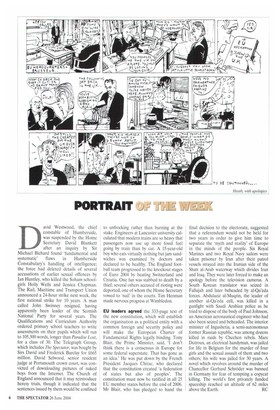D avid Westwood, the chief constable of Humberside, was suspended by
the Home Secretary David Blunkett after an inquiry by Sir Michael Bichard found 'fundamental and systematic' flaws in Humberside Constabulary's handling of intelligence; the force had deleted details of several accusations of earlier sexual offences by Ian Huntley, who killed the Soham schoolgirls Holly Wells and Jessica Chapman. The Rail, Maritime and Transport Union announced a 24-hour strike next week, the first national strike for 10 years. A man called John Swinney resigned, having apparently been leader of the Scottish National Party for several years. The Qualifications and Curriculum Authority ordered primary school teachers to write assessments on their pupils which will run to 105,300 words, longer than Paradise Lost, for a class of 30. The Telegraph Group, which includes The Spectator, was bought by Sirs David and Frederick Barclay for £665 million. David Selwood, senior resident judge at Portsmouth crown court, was convicted of downloading pictures of naked boys from the Internet. The Church of England announced that it may reintroduce heresy trials, though it indicated that the sentences issued by them would be confined
to unfrocking rather than burning at the stake. Engineers at Lancaster university calculated that modern trains are so heavy that passengers now use up more fossil fuel going by train than by car. A 15-year-old boy who eats virtually nothing but jam sandwiches was examined by doctors and declared to be healthy. The England football team progressed to the knockout stages of Euro 2004 by beating Switzerland and Croatia. One fan was stabbed to death by a thief; several others accused of rioting were deported, one of whom the Home Secretary vowed to 'nail' in the courts. Tim Henman made nervous progress at Wimbledon.
EU leaders agreed the 333-page text of the new constitution, which will establish the organisation as a political entity with a common foreign and security policy and will make the European Charter of Fundamental Rights legally binding. Tony Blair, the Prime Minister, said, 'I don't think there is a consensus in Europe for some federal superstate. That has gone as an idea.' He was put down by the French President Jacques Chirac, who declared that the constitution created 'a federation of states but also of peoples'. The constitution must now be ratified in all 25 EU member states before the end of 2006. Mr Blair, who has pledged to hand the final decision to the electorate, suggested that a referendum would not be held for two years in order to give him time to separate the 'myth and reality' of Europe in the minds of the people. Six Royal Marines and two Royal Navy sailors were taken prisoner by Iran after their patrol vessels strayed into the Iranian side of the Shatt al-Arab waterway which divides Iran and Iraq. They were later forced to make an apology before the television cameras. A South Korean translator was seized in Fallujah and later beheaded by al-Qa'eda forces. Abdulaziz al-Muqrin, the leader of another al-Qa'eda cell, was killed in a gunfight with Saudi Arabian police as he tried to dispose of the body of Paul Johnson, an American aeronautical engineer who had also been seized and beheaded. The interior minister of Ingushetia, a semi-autonomous former Russian republic, was among dozens killed in raids by Chechen rebels. Marc Dutroux, an electrical handyman, was jailed for life in Belgium for the murder of four girls and the sexual assault of them and two others; his wife was jailed for 30 years. A novel which revolves around the murder of Chancellor Gerhard Schroder was banned in Germany for fear of tempting a copycat killing. The world's first privately funded spaceship reached an altitude of 62 miles
above the Earth. RC


































































 Previous page
Previous page